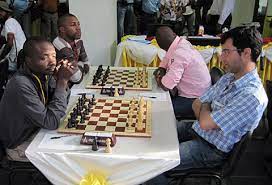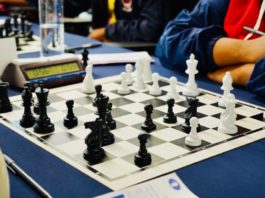In the echoing hallways of Gokomere High School, 14-year-old Kudzanai Mamombe stumbled upon a game that would chart the course of his life’s journey.
“In our boarding school hostels, options for entertainment were slim,” he shared.
Little did he realise that this strategic ballet would guide him through a whirlwind of triumphs and tests. Richard Knottenbelt, the mastermind of the school’s chess and math clubs and now a US resident, had fanned Mamombe’s budding enthusiasm into a fiery obsession.
“Knottenbelt led both the chess and math clubs,” Mamombe recounted.
From those Gokomere beginnings, Mamombe’s prowess began to shine. He had clinched trophies in over 40 chess tournaments, with his nearly flawless performance at the African Junior Championships as his crown jewel. “Merely two draws,” he said.
But beyond the scores, each game told a unique tale, like his intense match against India’s Tania Sachdev. “She was a formidable opponent and a graceful lady,” he reflected.
Describing their game, Mamombe jested, “It was fierce,” recalling Sachdev’s graceful surrender to an inevitable checkmate.
In 1990, Mamombe had etched his legacy, becoming Zimbabwe’s first black International Master.
“Earning the IM title back then was a mountainous task,” he noted.
Without today’s digital luxuries, Mamombe had found direction from a book: Fischer’s “My 60 Memorable Games.” “It became my chess bible,” he smiled. “My strategies mirrored those games.”
Yet, Mamombe hadn’t let chess success overshadow education. Grasping Africa’s realities, he had recognised the perils of relying solely on chess.
Well-wishers and his drive had steered him as he masterfully balanced studies, coaching, and chess. “The late Charles Kuwaza consistently highlighted education’s value,” he added. “One can excel in studies and chess alike.”
However, his path wasn’t always sunlit. Speaking candidly about Zimbabwe’s chess milieu, he critiqued, “Our chess organisers neglected the game’s growth.”
Pointing to administrative gaps, he had advocated for a model that prioritised players, mirroring European and Asian standards.
On discussing rising stars, he warmly named Roy Mwadzura but also somberly reflected on talents like IM Robert Gwaze, whom he felt “got frustrated and disappointed.”
Three decades in, Mamombe still eyes the horizon, dreaming of the Grandmaster title and continuing his passion for coaching.
Reflecting on his illustrious journey, the 1990 national championship gleamed distinctively. “That year silenced many sceptics, heralding a new chapter,” he recalled, marking the close of Charles Kuwaza’s era.
More than a chess genius, IM Mamombe stood as a storyteller, mentor, and guiding star for Africa’s emerging chess talents.




